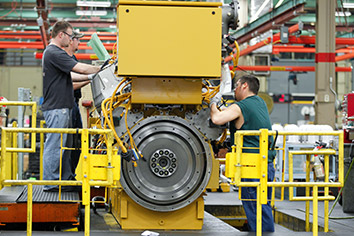Subscriber Benefit
As a subscriber you can listen to articles at work, in the car, or while you work out. Subscribe NowThe U.S. economy grew by 2.1% in 2022, notching six months of solid growth despite widespread concern that the country might be on the brink of a recession.
Those fears have been assuaged — at least for now. The economy posted another quarter of steady expansion between October and December, with economic activity increasing at a 2.9% annual rate, compared with 3.2% growth in the previous quarter, the Bureau of Economic Analysis said Thursday.
The latest figures point to a strong but slowing economy that has been tempered by the Federal Reserve’s aggressive efforts to control inflation. The central bank raised interest rates seven times last year, in hopes that higher borrowing costs would lead businesses and households to cut back enough to slow the economy and curb price increases.
Although some of those rate increases have already had a chilling effect — most notably in the housing market — economists say it could be months before the Fed’s actions fully work their way through the labor market and broader economy. Many major banks are forecasting an economic downturn this year.
“You may see [growth] and think the economy is out of the woods, but that would be entirely the wrong read,” said Joseph LaVorgna, chief economist at SMBC Nikko Securities America who expects a recession midyear. “There are a lot of variables that are all pointing in the same direction: There’s a housing recession. Manufacturing looks like it’s approaching recession. We’re seeing weakness in temp hiring. And it’s doubtful we’ve felt the full effects of all of the Fed’s rate hikes.”
The 2022 economy was, in many ways, defined by stubborn decades-high inflation. Higher prices on housing, food and gas strained family budgets and cut into corporate profits. The economy unexpectedly shrank in the first half of the year — setting off a flurry of recession fears — then returned to growth in the second half.
The latest gross domestic product reading marks a return to pre-pandemic growth rates after two years of wild fluctuations. The U.S. economy grew by a whopping 5.7% in 2021, after shrinking 3.4% the year before.
In the most recent quarter, consumer spending on services was expected to help lift the reading on GDP, which sums up goods and services produced in the U.S. economy.
But the economy was dragged down by a fast-cooling housing market and a slowdown in manufacturing. There are other signs of slowing, too: Retail sales, which were robust for most of the year, began to fray in December.
“It wasn’t a ‘Steady Eddy’ quarter,” said Liz Ann Sonders, chief investment strategist at Charles Schwab. “Things got off to a decent start, but then the economy started to tip a little. Consumer spending took a hit. The labor market has hung in there, but some of the layoff announcements have been pretty jarring. We’re starting to see more in-your-face deterioration.”
A number of the country’s biggest tech firms, including Microsoft, Amazon and Salesforce, have announced thousands of layoffs in recent weeks. Although those cuts haven’t yet spilled over into the broader job market, economists worry a slowing labor market could lead families to begin pulling back on purchases, which would further blunt the economy. (Amazon founder Jeff Bezos owns The Washington Post.)
The housing market, which is already in free fall, could face additional turmoil if laid-off workers don’t find new jobs and are forced to sell their homes, economists said. Overall residential investments fell nearly 20 percent in 2022, with new home construction notching its first yearly decline since 2009.
Home sales, meanwhile, have fallen for 11 straight months, according to the National Association of Realtors, as a result of higher borrowing costs. Average mortgage rates more than doubled last year, from 3 percent to 7 percent, making homeownership considerably more expensive for would-be buyers.
At JayMarc Homes near Seattle, sales slowed for much of last year, then came to a complete halt in the last quarter of 2022. The home builder, which typically sells 20 properties a year, didn’t sell a single house between October and December.
“We were one of the fastest markets in the country — people were begging us to sell them houses — and then suddenly it stopped,” said chief executive Marc Russo, who laid off 10 of his 50 employees in the fall. “No one could predict that interest rates would go up threefold in a matter of eight months.”
This year, though, he says business has improved: He has sold five homes in the last three weeks. But Russo isn’t rejoicing yet.
“I don’t have a crystal ball,” he said. “The macroeconomy is out of our control.”
Please enable JavaScript to view this content.

